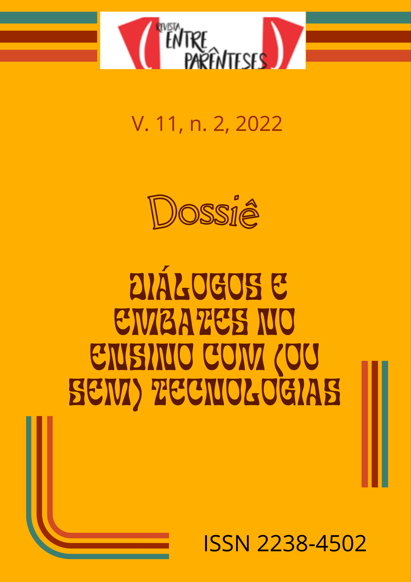THE USE OF DIGITAL RESOURCES IN A PHILOLOGICAL RESEARCH ITH PAINTED EX-VOTOS: INITIAL REFLECTIONS
Keywords:
Ex-voto; Philology; Digital Humanities.Abstract
Several humanities research increasingly assumed the usage of computational technologies in different stages of their work. In this sense, these types of tools could generate theoretical, methodological and institutional issues that should be discussed. With this squib, we would like to present some initial reflections in our research about the usage of computational technologies in the Philology area, more precisely with ex-voto (ETYM. Abbrv. from latin ex-voto suscepto 'the vow made/promise fulfilled') from the eighteenth and nineteenth centuries. Through certain technologies, it is possible to access the deeper layers of documentary sources – those that are not visible to the naked eye – and thus, as a result, produce a more complete edition that is more faithful to the original. We adopted as a theoretical point of view the works of Paixão de Souza (2013a e 2013b).
References
CASTRO, M. de M. Ex-votos mineiros: as tábuas votivas no ciclo do ouro. Rio de Janeiro: Expressão E Cultura, 1994.
FACHIN, P. R. M.; RIZZUTTO, M. de A.; ENGEL, W. G. P.; BOVOLENTA, J. B.; HAUY, R. J. V.; SOUZA, J. G. de. De vossa mercê, António José d’Amorim: estudo interdisciplinar de uma carta do século XIX. PÓS: Revista do Programa de Pós-graduação em Artes da EBA/UFMG, v. 11, n. 22, p. 78–115, 2021. Disponível em: https://doi.org/10.35699/2237-5864.2021.25832.
FIORMONTE, D.; NUMERICO, T.; TOMASI, F. The Digital Humanist: A Critical Inquiry. New York: Punctum Books, 2015.
LABOV, W. Building on empirical foundations. In: LEHMANN, W. P.; MALKIEL, Y. (Eds.). Perspectives on historical linguistics. Amsterdam; Philadelphia: John Benjamins, 1982. p. 17-92.
LOSE, A. D. [et. al.] . Edições digitais de manuscritos: do século XVI ao século XXI. In: CIRILLO, J.; PASSOS, M. H. P. (Orgs.). Materialidade e virtualidade no processo criativo. Vinhedo: Horizonte, 2011. p. 77-99.
MARQUILHAS, R.; HENDRICKX, I. Avanços nas Humanidades Digitais. In: MARTINS, A. M.; CARRILHO, E. (Orgs.) Manual de Linguística Portuguesa. Berlin/Boston: De Gruyter, 2016.
PAIXÃO DE SOUSA, M. C. Texto digital: uma perspectiva material. Revista da Anpoll, v. 1, n. 35, p. 15–60, 2013a. Disponível em: https://doi.org/10.18309/anp.v1i35.643.
PAIXÃO DE SOUSA, M. C. A Filologia Digital em Língua Portuguesa: Alguns caminhos. In: Banza, A. P.; GONÇALVES, M. F. (Coord.). Património textual e humanidades digitais: da antiga à nova Filologia. Évora: Centro Interdisciplinar de História, Culturas e Sociedades da Universidade de Évora (CIDEHUS) / Fundação para a Ciência e a Tecnologia (FCT), 2013b. Disponível em: http://dspace.uevora.pt/rdpc/bitstream/10174/10468/1/e-book.pdf.
QUARESMA, P. Análise linguística de documentos da Biblioteca Pública de Évora: uma abordagem informática. In: Banza, A. P.; GONÇALVES, M. F. (Coord.). Património textual e humanidades digitais: da antiga à nova Filologia. Évora: Centro Interdisciplinar de História, Culturas e Sociedades da Universidade de Évora (CIDEHUS) / Fundação para a Ciência e a Tecnologia (FCT), 2013. Disponível em: http://dspace.uevora.pt/rdpc/bitstream/10174/10468/1/e-book.pdf.
SCARANO, J. Fé e milagre: ex-votos pintados em madeira - séculos XVIII e XIX. São Paulo: Edusp, 2004.
Downloads
Published
How to Cite
Issue
Section
License
Os direitos autorais para trabalhos científicos são do autor, com direitos de primeira publicação para a revista. Como esta é uma revista eletrônica de acesso público, os artigos são de uso gratuito, em aplicações educacionais e não-comerciais, devendo ser observada a legislação sobre direitos autorais, em caso de utilização dos textos publicados nesta revista.
- Autores mantém os direitos autorais e concedem à revista o direito de primeira publicação, com o trabalho simultaneamente licenciado sob a Licença Creative Commons Attribution que permite o compartilhamento do trabalho com reconhecimento da autoria e publicação inicial nesta revista.
- Autores têm autorização para assumir contratos adicionais separadamente, para distribuição não-exclusiva da versão do trabalho publicada nesta revista (ex.: publicar em repositório institucional ou como capítulo de livro), com reconhecimento de autoria e publicação inicial nesta revista.
- Autores têm permissão e são estimulados a publicar e distribuir seu trabalho online (ex.: em repositórios institucionais ou na sua página pessoal) a qualquer ponto antes ou durante o processo editorial, já que isso pode gerar alterações produtivas, bem como aumentar o impacto e a citação do trabalho publicado


